Antibody (Suitable for clinical applications)
Sample Type: FFPE Patient Samples.
Tested Applications: IHC. Approved for In Vitro Diagnostic Procedures on FFPE tissues. For tissue collection recommendations, please see datasheet sent with product.
Application Notes
| Specification | Recommendation |
|---|---|
| Recommended Dilution (Conc) | 1:50-1:200 |
| Pretreatment | Citrate Buffer pH 6.0 |
| Incubation Parameters | 30 min at Room Temperature |
Prior to use, inspect vial for the presence of any precipitate or other unusual physical properties. These can indicate that the antibody has degraded and is no longer suitable for patient samples. Please run positive and negative controls simultaneously with all patient samples to account and control for errors in laboratory procedure. Use of methods or materials not recommended by enQuire Bio including change to dilution range and detection system should be routinely validated by the user.
Clonality: Monoclonal
Anti-Cytokeratin 18 Antibody Clone: DC10
Host and Isotype: Mouse IgG1
Recommended Positive Control Sample: Skin
Cellular Localization of Antibody DC10 Staining: Cytoplasmic
Buffer and Stabilizer: PBS with 1% BSA and 0.05% NaN3
Antibody Concentration: Lot specific. Plese contact tech support for data.
Immunogen: BALB/C mice were injected with PMC-42 human breast carcinoma cell line.
Storage Conditions: This antibody should be stored refrigerated (2-8°C). This product should not be used past the expiration date printed on the vial.
Cytokeratin 18 Information for Pathologists
Summary:
Molecular weight is 45 kDa. Pairs with CK8. Ethanol causes CK8/18+ Mallory body like inclusions by (a) causing oxidative stress, which (b) inhibits proteasomes that normally remove ubiquinated cytokeratins, which (c) causes accumulation of ubiquinated cytokeratins (Exp Mol Pathol 2006;81:191). Various CK8/CK18 mutations may increase susceptibility to liver disease (Gastroenterology 2005;129:885) including cryptogenic cirrhosis (J Clin Invest 1997;99:19). Is a marker of fetal mid-face (primary palate) growth and fusion (J Dent Res 2005;84:69).Common Uses By Pathologists:
Serum tumor marker for breast cancer (Am J Clin Pathol 2005;123:66) and T3/T4 bladder carcinoma (Clin Biochem 2002;35:327). An airway epithelial cell autoantigen associated with nonallergic asthma; a possible serum marker (also CK19) for toluene diisocyanate-induced asthma among exposed workers (Yonsei Med J 2006;47:773). RT-PCR to assess sentinel lymph nodes in colon carcinoma (Scand J Gastroenterol 2006;41:1073) and lymph nodes of gastric carcinoma (World J Gastroenterol 2005;11:6530). Loss of expression in breast carcinoma may be a poor prognostic factor (Clin Cancer Res 2004;10:2670). Cleaved cytokeratin-18 is a marker of apoptosis (J Histochem Cytochem 2005;53:229).Limitations and Warranty
This antibody is manufactured in accordance with clinical good manufacturing practices in an ISO13485:2016 certified production facility. It is intended for multiple uses including in vitro diagnostic use and research use only applications. Please see vial label for expiration date. We strive to always deliver antibodies with a shelf life of at least two years.

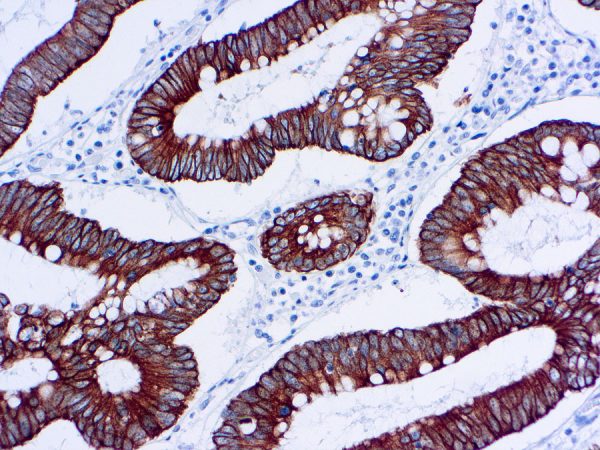



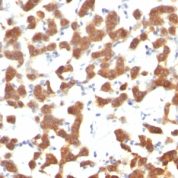
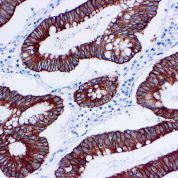
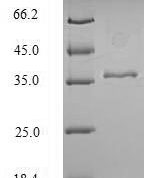
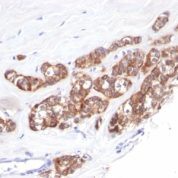
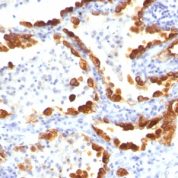
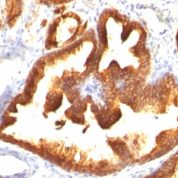
![Analysis of Mass Spec data (dashed-line) of fractions stained with Cytokeratin 18 MS-QAVA™ monoclonal antibody [Clone: B23.1] (solid-line), reveals that less than 13.5% of signal is attributable to non-specific binding of anti-Cytokeratin 18 [Clone B23.1] to targets other than KRT18 protein. Even frequently cited antibodies have much greater non-specific interactions, averaging over 30%. Data in image is from analysis in A431, RT4 and MCF7 cells.](https://cdn-enquirebio.pressidium.com/wp-content/uploads/2017/10/enQuire-Bio-3875-MSM9-P1-anti-Cytokeratin-18-antibody-178x178.png)
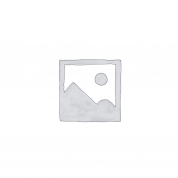
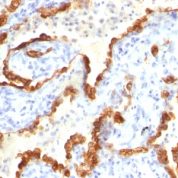
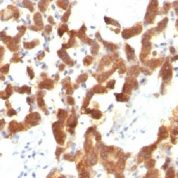
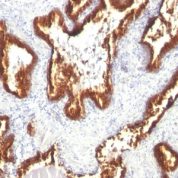
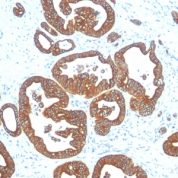
There are no reviews yet.